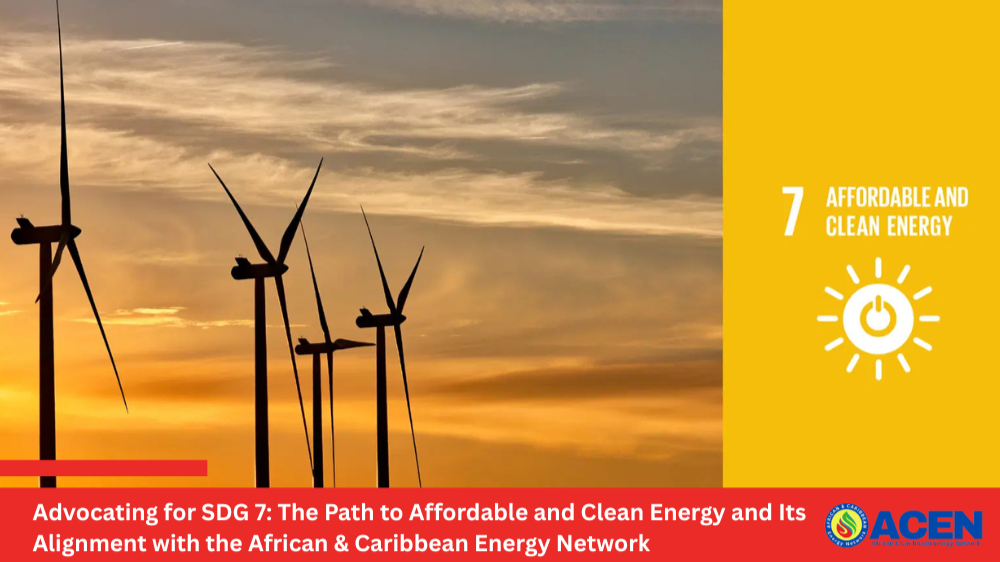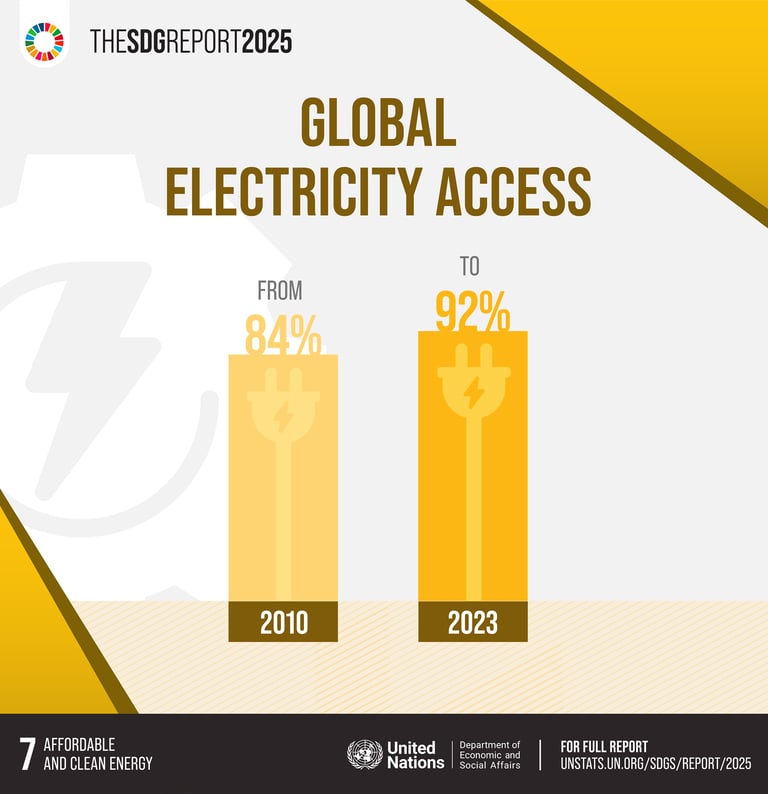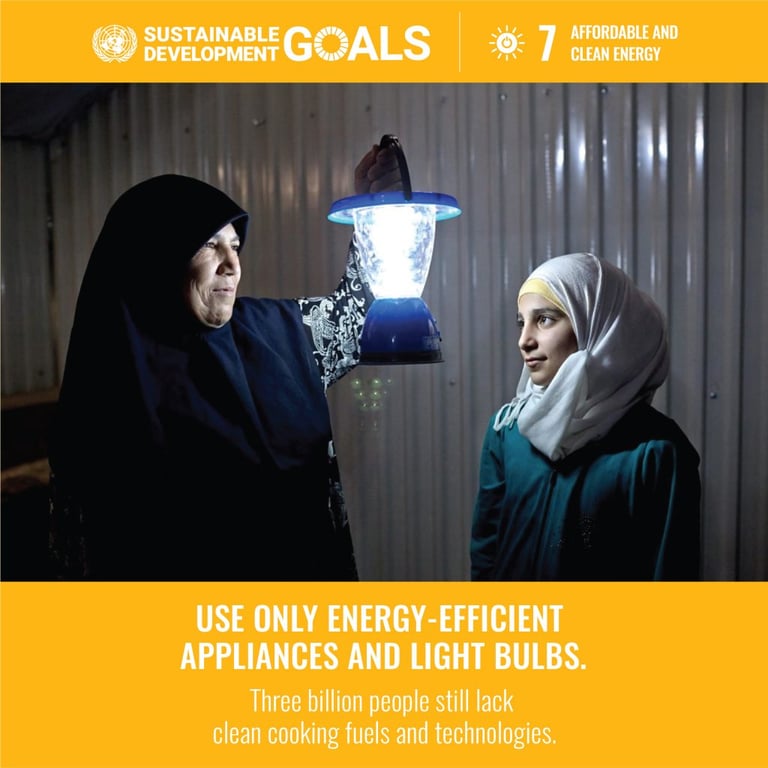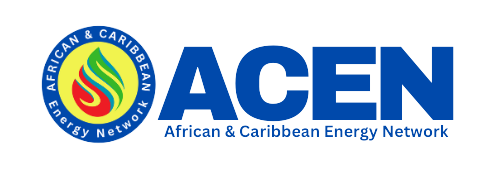Info@acenergynetwork.org | 9950 Westpark Dr, Suite 520, Houston, Texas 77063, US
Advocating for SDG 7: The Path to Affordable and Clean Energy and Its Alignment with the African & Caribbean Energy Network
8/11/20255 min read


In an era where energy poverty affects millions and climate change poses existential threats, Sustainable Development Goal 7 (SDG 7) stands as a beacon for global progress. SDG 7 calls for ensuring access to affordable, reliable, sustainable, and modern energy for all. As we mark the midpoint toward the 2030 Agenda, the importance of supporting and advocating for this goal cannot be overstated—particularly in regions like Africa and the Caribbean, where energy access gaps hinder development.
The African & Caribbean Energy Network (ACEN) , a professional membership network dedicated to collaborative energy initiatives, plays a pivotal role in this effort. By fostering networking, research, knowledge sharing, and innovation among stakeholders, researchers, and students, ACEN directly supports SDG 7 to combat energy poverty and drive sustainable energy practices in African and Caribbean communities.
This edition of our newsletter delves into the elements of SDG 7, including its targets, timeline, and current progress, while highlighting how ACEN's mission aligns with these objectives to create a more equitable energy future.
Understanding SDG 7: Targets and Timeline
SDG 7, adopted as part of the United Nations' 2030 Agenda for Sustainable Development in 2015, sets a clear timeline: achieve its targets by 2030.
This goal addresses the interconnected challenges of energy access, renewable integration, and efficiency, with five key targets:
Target 7.1: By 2030, ensure universal access to affordable, reliable, and modern energy services. This includes electricity and clean cooking fuels, measured by indicators like the proportion of the population with electricity access and clean cooking solutions.
Target 7.2: By 2030, increase substantially the share of renewable energy in the global energy mix. Progress is tracked through the renewable energy share in total final energy consumption.
Target 7.3: By 2030, double the global rate of improvement in energy efficiency. This is monitored via primary energy intensity (energy use per unit of GDP).
Target 7.a: By 2030, enhance international cooperation to facilitate access to clean energy research and technology, including renewable energy, energy efficiency, and advanced cleaner fossil-fuel technology, and promote investment in energy infrastructure and clean energy technology. Indicators focus on international financial flows to developing countries for clean energy.
Target 7.b: By 2030, expand infrastructure and upgrade technology for supplying modern and sustainable energy services for all in developing countries, in particular least developed countries, small island developing States, and land-locked developing countries. This is assessed through the proportion of the population served by modern energy services.
These targets are supported by specific indicators that allow for measurable tracking, emphasizing equity and sustainability.
The 2030 deadline underscores the urgency, as halfway through the agenda, accelerated action is needed to meet these benchmarks.
Current Progress and Challenges in Achieving SDG 7The 2025 Sustainable Development Goals Report provides a sobering yet hopeful update on SDG 7.


Globally, electricity access has risen to 92% in 2023 from 84% in 2010, leaving 666 million without power—primarily in sub-Saharan Africa. Access to clean cooking has improved to 74% in 2023 from 64% in 2015, but 2.1 billion people still use polluting fuels. Renewable energy's share in total final energy consumption reached 17.9% in 2022, with modern renewables at 13%, while energy efficiency improved by 2.1% in 2022. Installed renewable capacity per capita hit 478 watts in 2023, growing 13% annually, and international clean energy flows to developing countries surged 27% to $21.6 billion in 2023. However, projections indicate we're off track: by 2030, 645 million may lack electricity, and 1.8 billion could still rely on unclean cooking.
Challenges include regional disparities, insufficient investments (below 2016 peaks), and slow adoption in key sectors like transport and heat. In Africa, particularly sub-Saharan Africa, progress is stagnant: electricity access rose to 53% in 2023, but 565 million remain unconnected, accounting for 85% of the global deficit.
Clean cooking access is only 21%, and renewable capacity per capita is a mere 40 watts. In the Caribbean, as part of Small Island Developing States (SIDS), renewable capacity stands at 110 watts per capita, with financial flows unevenly distributed and vulnerabilities to climate impacts exacerbating energy insecurity.
Achievements include 45 countries reaching universal electricity access since 2010 and renewables poised to surpass coal in electricity generation by 2025, driven by leaders like China, Brazil, and India. Recommendations from the report emphasize boosting investments in distributed renewables (e.g., off-grid solar for 389 million people), accelerating efficiency to 4% annually, and ensuring equitable financial flows to least developed countries (LDCs), land-locked developing countries (LLDCs), and SIDS.
The Importance of Supporting and Advocating for SDG 7. Supporting SDG 7 is crucial for multiple reasons. Economically, it unlocks growth by powering industries, creating jobs in renewables (projected to reach 42 million globally by 2050), and reducing import dependencies in fossil fuel-reliant regions. Socially, it combats energy poverty, improving health (by reducing indoor air pollution from unclean cooking, which causes 3.7 million premature deaths annually) and enabling education and healthcare through reliable electricity. Environmentally, it mitigates climate change by cutting emissions—renewables could provide 90% of power sector decarbonization by 2050—and enhances resilience in vulnerable areas like the Caribbean, prone to hurricanes and rising seas.
In Africa and the Caribbean, advocacy is vital given the stark disparities: over 600 million Africans lack electricity, and Caribbean islands face high energy costs (up to 40% of GDP on imports). By prioritizing SDG 7, we can address these inequities, foster innovation in solar, wind, and hydro, and align with broader goals like SDG 13 (Climate Action) and SDG 1 (No Poverty). Advocacy through policy influence, public awareness, and partnerships amplifies impact, ensuring no one is left behind.


Alignment with the African & Caribbean Energy Network's Mission ACEN's commitment to SDG 7 is intrinsic to its core mission. As a network uniting stakeholders, researchers, and students, ACEN promotes collaborative initiatives that directly advance SDG 7's targets. For instance, by facilitating knowledge and resource sharing, ACEN supports Target 7.1 through projects enhancing access to modern energy in underserved communities, such as off-grid solar solutions in rural Africa.
ACEN's focus on innovation aligns with Target 7.2, encouraging renewable energy adoption via research collaborations that boost the share of clean sources in the energy mix. Networking events and partnerships help double energy efficiency (Target 7.3) by disseminating best practices in efficient technologies. Moreover, ACEN enhances international cooperation (Target 7.a) through cross-regional dialogues, attracting investments and technology transfers to Africa and the Caribbean. By expanding infrastructure (Target 7.b), ACEN advocates for upgrades in SIDS and LDCs, addressing the report's call for equitable flows.
Ultimately, ACEN's efforts to eradicate energy poverty for 1 million people by 2035 complement SDG 7's 2030 timeline, creating synergies that accelerate progress. Through sustainable practices, ACEN not only supports but embodies SDG 7, turning advocacy into actionable change.
SDG 7 is more than a goal—it's a blueprint for a sustainable, inclusive world. As the 2025 report highlights, while strides have been made, urgent advocacy and support are needed to bridge gaps, especially in Africa and the Caribbean.


ACEN stands at the forefront, aligning its mission to foster the networks and innovations that will make affordable, clean energy a reality. Join us in this vital cause: become a member, participate in our events, or advocate for policies that prioritize SDG 7. Together, we can power a brighter future.
For the full 2025 SDG Report on Goal 7, visit unstats.un.org/sdgs/report/2025/Goal-07/
© 2025. All rights reserved.


Contact Us
African & Caribbean Energy Network
9950 Westpark Dr, Suite 520,
Houston, TX 77063, US
Email: info@acenergynetwork.org
